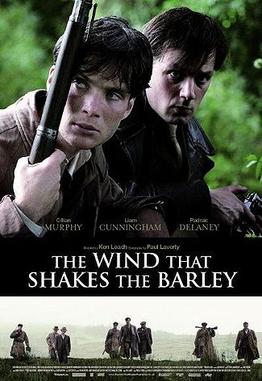The Wind That Shakes the Barley is a 2006 Irish war drama film directed by Ken Loach, set during the Irish War of Independence (1919–1921) and the Irish Civil War (1922–1923). Written by long-time Loach collaborator Paul Laverty, this drama tells the story of two County Cork brothers, Damien O'Donovan (Cillian Murphy) and Teddy O'Donovan (Pádraic Delaney), who join the Irish Republican Army to fight for Irish independence from the United Kingdom. It takes its title from the song "The Wind That Shakes the Barley".
Widely praised, the film won the Palme d'Or at the 2006 Cannes Film Festival. Loach's biggest box office success to date, the film did well around the world and set a record in Ireland as the highest-grossing Irish-made independent film ever, until the record was broken by The Guard in 2011.
| The film opens in 1920 as Damien O'Donovan (Cillian Murphy), a young doctor, is about to leave Ireland to work in a London hospital. His brother Teddy (Pádraic Delaney) commands the local flying column of the Irish Republican Army. After a hurling match, Damien witnesses the fatal beating of his friend, Micheál Ó Súilleabháin, by British Black and Tans. Damien rebuffs his friends' entreaties to stay in Ireland and fight for independence from Britain, saying that the IRA is too outnumbered to win. As he is leaving town, Damien witnesses British soldiers beating a railway guard for refusing to allow the troops to board, as well as the subsequent resistance of the train driver (Liam Cunningham). Damien decides to stay and joins Teddy's IRA brigade. |
In retaliation for Micheál's murder, the brigade raids the local Royal Irish Constabulary barracks for guns, then uses them to assassinate four British Auxiliaries. In the aftermath, Anglo-Irish landowner Sir John Hamilton (Roger Allam) coerces one of his servants, IRA member Chris Reilly (John Crean), into passing information to the British Army Intelligence Corps. As a result, the entire brigade is taken prisoner. In their cell, Damien meets the train driver, Dan, a union organizer who shares Damien's Marxist views. Meanwhile, British officers interrogate Teddy, pulling out his fingernails when he refuses to name names. Later, Johnny Gogan (William Ruane), an Irish-Scots soldier in the British Army, helps all but three of the prisoners escape. After the actions of Sir John and Chris are revealed to the IRA, both are taken hostage. As Teddy is still recovering, Damien is temporarily placed in command. News arrives that the three remaining IRA prisoners have been tortured and shot. Therefore, the brigade receives orders to execute Sir John and Chris. Despite the fact that Chris is a lifelong friend, a shattered Damien summarily executes both him and Sir John. Later, Damien tells his sweetheart, Cumann na mBan courier Sinéad Sullivan (Orla Fitzgerald), about the shame of facing Chris's mother. After the IRA ambushes and defeats an armed convoy of the Auxiliary Division, another detachment of Auxiliaries loots and burns the farmhouse of Sinéad's family in retaliation. Sinéad is held at gunpoint while her head is shaved. Later, as Damien comforts her, a messenger arrives with news of a formal ceasefire between Britain and the IRA. While the village celebrates, Damien and Sinéad steal away for a romantic interlude.
When the terms of the Anglo-Irish Treaty are announced, the IRA divides over whether or not to accept it, as it only grants Ireland Dominion status. Teddy and his allies argue that accepting the Treaty will bring peace now while further gains can be made later. Others within the Brigade oppose the Treaty, proposing to continue the war until complete full independence can be obtained. Dan and Damien further argue in favor of the collectivisation of industry and agriculture. Any other course, declares Dan, will change only, "the accents of the powerful and the colour of the flag." Not all Anti-Treaty Republicans are depicted as agreeing, however. Later, as the new Irish Free State replaces British rule, Teddy and his allies begin patrolling in Irish Army uniforms. Meanwhile, Damien and his Anti-Treaty comrades feel betrayed and join the Anti-Treaty IRA. After the Irish Civil War breaks out, Damien and Dan's column begins a guerilla war against the new Irish Army. As the violence between the two sides escalates, Teddy expresses fear that the British will return if the Free State fails to solve the problem on its own. As a result, he decrees, "They take one out, we take one back. To hell with the courts." Teddy's vigilante attitude was foreshadowed in his earlier response to a verdict of the Dáil Court.
Ultimately, Dan is killed and Damien is captured during a raid for arms on a Free State barracks commanded by Teddy. Sentenced to death, Damien is held in the same cell where the British Army imprisoned them earlier. Hoping to avoid executing his brother, Teddy pleads with Damien to reveal where the IRA is hiding the stolen rifles, offering him full amnesty and the vision of a life with Sinéad. Damien responds, "I shot Chris Reilly in the heart. I did that. You know why? I am not going to sell out." Devastated, Teddy leaves the cell in tears.
Writing a goodbye letter to Sinéad, Damien declares his love for her, saying that he knows what he stands for and is not afraid. At dawn, Damien is marched before a firing squad. As both brothers fight back tears, Teddy gives the order, the squad fires, and Damien crumples to the ground. That afternoon, Teddy delivers Damien's letter to Sinéad. Enraged and heartbroken, she flails uselessly against Teddy, then orders him off her land. She falls to her knees mourning Damien, while Teddy walks away.


No comments:
Post a Comment